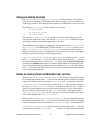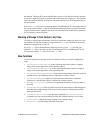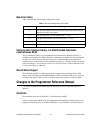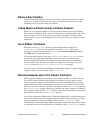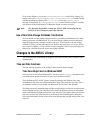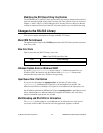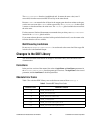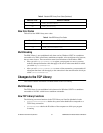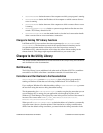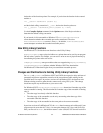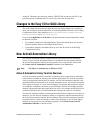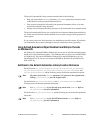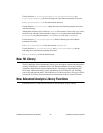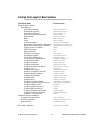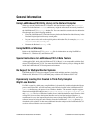
©
National Instruments Corporation 35 LabWindows/CVI Release Notes for Windows
The ActiveX Automation Library contains functions that do the following:
• Help you work with the
VARIANT parameters, SAFEARRAY parameters, and return values
of the functions in the generated instrument drivers
• Free resources dynamically allocated by the generated instrument drivers or by other
ActiveX Automation Library functions
• Display error information the library functions or the Automation server methods return
The ActiveX Automation Library also contains low-level functions that the generated drivers
use. These low-level functions invoke methods of server objects and get and set properties of
server objects.
If you want to use the low-level functions, you should know ActiveX concepts. In particular,
you should know how to browse through an ActiveX Automation server type library.
Using ActiveX Automation Object Handles from Multiple Threads
on Windows 95
On Windows 95, without DCOM for Windows 95, you can use an ActiveX Automation object
handle only in the thread that created it. This limitation does not exist if you install DCOM
for Windows 95. You can find DCOM for Windows 95 in the DCOM directory on your
LabWindows/CVI CD. You also can download DCOM for Windows 95 from Microsoft’s
Web or FTP site.
Additions to the ActiveX Automation Library Function Reference
For the functions CA_VariantDispatch, CA_VariantIUnknown, CA_VariantBSTR,
CA_VariantSetDispatch, CA_VariantSetIUnknown, CA_VariantSetBSTR, and
CA_VariantSetSafeArray, add the following text to the function parameter discussion:
Note
The value stored in the VARIANT parameter is a reference to the original value.
Calling
CA_VariantClear frees the original value.
For the functions
CA_VariantSet1DArray and CA_VariantSet2DArray, add the
following text to the function parameter discussion:
Note
Use CA_VariantClear to free the safe array stored in the VARIANT. Refer to
CA_VariantClear for more information.
For the function
CA_VariantSetCString, add the following text to the function parameter
discussion:
Note
Use CA_VariantClear to free the BSTR stored in the VARIANT. Refer to
CA_VariantClear for more information.



